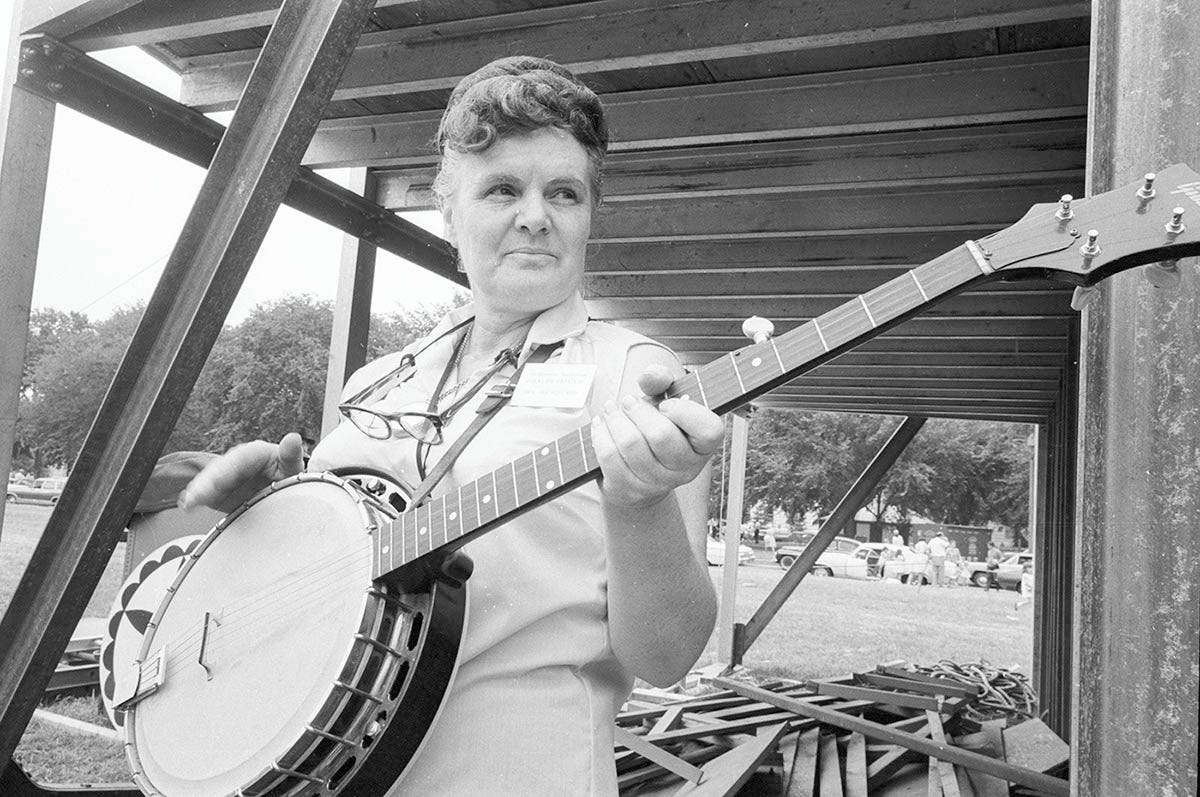Author: NC Department of Natural and Cultural Resources

Ashe County, which touches the Tennessee and Virginia borders, is touted by residents — many of them part-time dwellers who are otherwise “city folk” — as the “coolest corner of North Carolina.” And indeed, the year-round temperatures are lower owing to the higher elevations and what seems, in those neighborhoods of cabins now sprouting in the mountains, like thick, tall trees that create a perpetual shade.
It’s true that Ashe County now has become a favorite “second home” spot for those who live in the state’s cities and for those who’ve vacationed here even from the big cities of the Northeast. Property is ever-increasing in value, and part-time residents can move into any number of “neighborhoods” where they can feel isolated in their cabins but in fact, have neighbors all around and, by the way, satellite television and assorted citified conveniences.
Chances are, Ola Belle Reed, who died in 2002 at the age of 85, would have good and bad things to say about what’s happened to her native Ashe County. After all, her songs, so many songs, tell the story of her home in simple, sometimes mournful lyrics, and she was herself a woman of simple values. But it would be woefully unfair to try to put thoughts in her legacy almost 20 years after her death. And we know, being a woman of the North Carolina mountains (she later lived in Pennsylvania and Maryland), that she definitely wouldn’t like people putting thoughts in her head that were not her own.
She was born in Grassy Creek, a great name for a birthplace in the Blue Ridge Mountains, to a family full of musicians who played the traditional mountain instruments of dulcimer, guitar, and banjo. She was buried, 85 years later, in West Nottingham, Maryland, one of the places her Depression-era young life took her. Yes, she was then far from home, but Ola Belle Reed (born Ola Wave Campbell in 1916) was never far from home, not really.
For in her later years, thanks to a rediscovery by the world of universities of the importance of folklore and the role of music in the life of the South and of the mountain culture of North Carolina in particular, Ola Belle Reed would become very well known indeed in her native North Carolina and by the way, in the United States of America.
The latter fame happened when she won a National Heritage Fellowship from the National Endowment for the Arts in 1986. At that point, she’d played with some other famous North Carolina musicians, including Doc Watson.
Old Belle Reed had, you see, written a song, “I’ve Endured,” that may be the simplest and most eloquent anthem for people going through hard times, in her case the Depression. To call it a masterpiece is to not say enough. It is, essentially, the story of every child of the Depression, a story that was written on the face of Ola Belle Reed.
It is a strong face, a face lined by hardship but given to hope, a face of strength and honesty and character. It is an extraordinary face indeed, and in its strength, people find much to compare with their own grandparents who came through the hardest of times.
And then there’s the song. “I’ve Endured” has been recorded by multiple artists, including Del McCoury, the Bluegrass Hall of Fame member who “cut” the song at a time when he was playing small festivals and his now-legendary white pompadour was jet black. McCroury plays the tune lightning fast. But that’s not how Ola Belle Reed played it or perhaps intended it. (McCroury to be fair has a style his own, and his recording was supposed to show respect to Ola Belle Reed, after all.)
There are, perhaps, not many songs worthy of being reprinted in entirely. But “I’ve Endured” is one of them. And it’s good to think, as one reads the lyrics, of these words coming from the strong mind of Ola Belle Reed, and from the hard life experiences that produced it.
Born in the mountains, many years ago
Climbed these hills and valleys through the rain and snow
I’ve seen the lightning flashin’, heard the thunder rollI’ve endured, I’ve endured, how long must one endure
Barefoot in the summer, on into the fall
Too many mouths to feed, they couldn’t clothe us all
Sent to church on Sunday to learn the golden ruleI’ve endured, I’ve endured, how long must one endure
I’ve worked for the rich, I’ve lived with the poor
I’ve seen many heartaches and I’ll see many more
I’ve lived loved and sorrowed, been through success’s doorI’ve endured, I’ve endured, how long must one endure
Before a stroke took her ability to perform in 1987, Reed had recorded 75 songs for the Library of Congress, been honored by her home state, and become one of the symbols of mountain folk music and bluegrass. Her “claw hammer” or old-time style on the banjo inspired generations of women performers who came after her. One fan may have said it best: Her music, he wrote, “sounds like home.”

